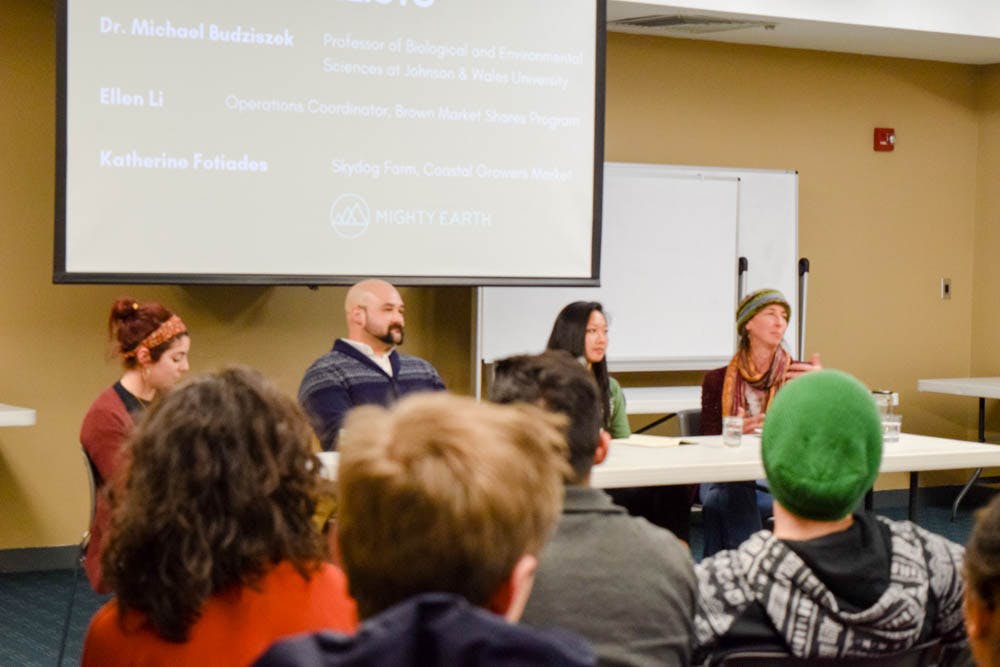If there’s one thing Mark Phillips, a local farmer, knows best, it’s how to grow a head of lettuce.
As a hydroponic farmer, he uses a nutrient-dense solution, which allows him to yield more produce with less water and fertilizer than typical farming methods. He and his business partner, Katherine Fotiades, of Skydog Farm are looking to educate others about the alternative farming method.
They found a new audience March 21, at the “Food, Farming and Our Future: A Panel on Sustainable Agriculture” event, where Fotiades spoke alongside Michael Budziszek, professor of Biological and Environmental Sciences at Johnson & Wales University, and Ellen Li ’21, operations manager of Brown Market Shares.
Students and community members listened to panelists discuss challenges facing the current food system nationwide, with supporting local farmers soaring to the top of the list.
As a small scale farmer, Phillips quickly found that he could not make a living selling his produce to large commercial businesses like Stop & Shop and Whole Foods. Instead, the hydroponic farmer has changed his business model to sell directly to customers at farmers’ markets.
Fotiades stressed the hidden costs that may not be taken into account in the prices of industrially-produced food, a reason food at the farmers’ market costs more. “Large scale, industrialized produced food appears to be cheaper, but when you factor in other costs outside of the operational costs that are absorbed directly by the farmer, it is a much higher cost of food than many people are aware of,” she said. “A lot of people aren’t aware or understand what the true cost of food is, and/or they’re not making a living wage and are able to afford what food truly costs.”
Li also emphasized the importance of locally sourcing food to move toward a more sustainable food system. She highlighted the Brown Market Share program, which as a student-run, campus-based food distribution program, connects members of College Hill with food from nearby farmers.
Similarly, Budziszek said that small and local farmers are an essential buffer against upheavals in the global food market, which could crash. He also emphasized the use of technology to grow food locally.
Speakers also discussed climate change and unequal access to food as harsh realities facing the agriculture community today, both nationwide and in Rhode Island in particular. Phoebe Chatfield, an organizer with Mighty Earth Rhode Island, criticized the state for its partnership with Infinity Meat Solutions, LLC, a meat processessing facility that hired Cargill Protein as a consultant and manager of the site’s operations and employees. Infinity Meat Solutions is a subsidiary of Stop & Shop’s Dutch parent company, WPRI reported.
In May 2018, Infinity Meat Solutions received $1.915 million in Rebuild Rhode Island Tax Credits to build a new facility in North Kingstown. Construction on the facility, which plans to employ 700 people by its third year of operation, began in October.
Mighty Earth Rhode Island organized the panel in light of plans for the facility, calling attention to what Chatfield called Cargill’s “uniquely bad track record of water pollution, deforestation and other environmental and political harms.”
“This new partnership has moved the state a big step in the wrong direction,” Chatfield added. “We’ve been demanding that Stop & Shop stop sourcing its meat from Cargill until Cargill cleans up its act on pollution and deforestation.”
But not all audience members were convinced they should oppose the facility. One attendee noted that with Rhode Island close to losing a representative at the federal level because of population decrease, the state is not in a position to turn away jobs.
“I’m in college right now, and students either don’t want to stay here, or want to and can’t afford it, because there are no jobs or there aren’t well-paying jobs,” said Dave McGraw, a student at JWU. “Are we really in a position to turn (the facility) away from an economic standpoint?”
Budziszek and Mighty Earth representative Gabi Hatem both believed that maintaining moral standards was more important than the economic gain of the potential jobs.
“We’re not opposed to the plant, we’re opposed to Cargill,” Hatem said. “If we had a company that came in with a really great track record, and treated their employees well, then yes, please come in, but we don’t want bad jobs just to say we have jobs.”





